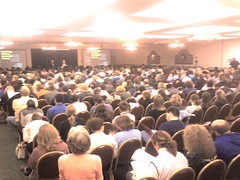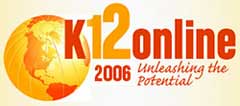Today’s workshop at ACTEM doesn’t start until this afternoon, so I have an hour to kill, and Candace Hackett Shively has taken care of that for me. She commented on a recent post about David Weinberger’s comparison of the Wikipedia and The New York Times — A WOW Moment…
Candace says that the nature of authority and academia is an important one, but she asks a very practical question.
…How do we ease eight year olds into understanding that no single source is truly “authoritative”? The question of authority should certainly come into the educational process, but at what point are children ready to handle it? Note that I say children, not youth.
…snip…
So where or when do we say to children,”consider the idea that no single source is THE source” ? Do we ever say that attiribution is one way of determining authority? If not, how do we help YOUNG students begin to develop the literacy they need to survive as critical consumers of information? What are the baby stepsto lead a concrete thinker into an age-appropriate, “starter” litera
Gmail – [2 Cents Worth] Comment: “A WOW Moment — Up Early in the Morning”
I have something to say on the matter, but I must admit, first, that I have almost no experience at teaching primary level children. I couldn’t do it. So as far as any formal understanding of readiness, I am sitting out in left field. I’m comfortably here. I have my own furniture.
I think that it is important that we try NOT to teach that “no one source is THE source”. Instead, we should simply teach that source is important. In the primary grades, it has very little to do with citations, and more to do with the conversations that are already happening. If a teacher stands in front of his class and says that the world is like this, or grocery stores are like this, then that teacher is teaching his student to assume the authority of THE source. However, if the teacher says that according to this source, this person, or this logic, the world is like this, or according to Sally Johnson, the manager of our Piggly Wiggly store, grocery stores provide this… — and that is part of every conversation, then the teacher is teaching students that the the source of the information is as important as the information itself.
This is a good conversation. Anyone want to contribute?
technorati tags:warlick, education, literacy, literacy21
Blogged with Flock
An 8th grade science teacher, Ms. S, retrieves her MP3 player from the computer-connected cradle where it’s spent the night scanning the 17 podcasts she subscribes to. Having detected three new programs, the computer downloaded the files and copied them to the handheld. En route to work, Ms. S inserts the device into her dash-mounted cradle and reviews the podcasts, selecting a colleague’s classroom presentation on global warming and a NASA conference lecture about interstellar space travel.

 I have a very busy day and almost not time for blogging. I would like to pass along that last week my daughter, who is studying history and secondary education, wrote that all of her social sciences courses were expecting the Chicago style of citations on her papers. Bummer!
I have a very busy day and almost not time for blogging. I would like to pass along that last week my daughter, who is studying history and secondary education, wrote that all of her social sciences courses were expecting the Chicago style of citations on her papers. Bummer!

 Lots of conversations now. They are heated, contentious, threatening to many of us, and they are all good. It’s where we learn today, in these conversations.
Lots of conversations now. They are heated, contentious, threatening to many of us, and they are all good. It’s where we learn today, in these conversations.